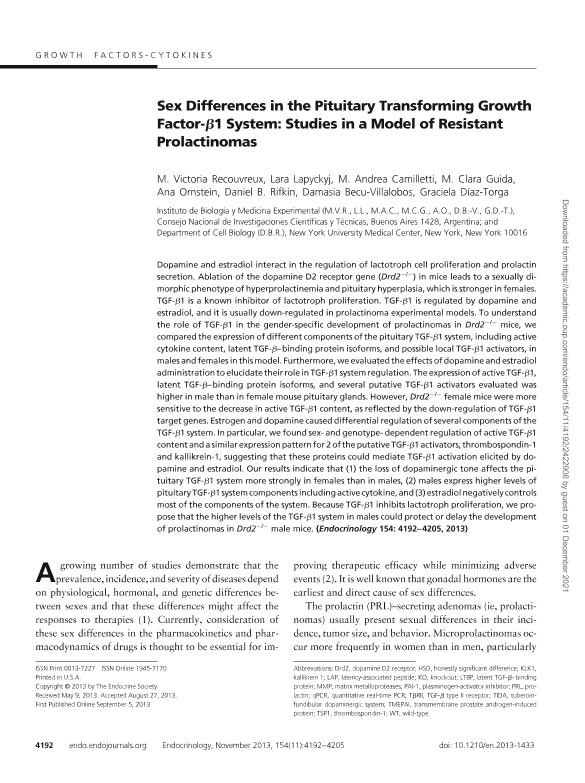Artículo
Sex differences in the pituitary transforming growth factor-beta1 (TGF-beta1) system: studies in a model of resistant prolactinomas
Recouvreux, Maria Victoria ; Lapyckyj, Lara
; Lapyckyj, Lara ; Camilletti, María Andrea
; Camilletti, María Andrea ; Guida, María Clara; Ornstein, Ana Maria
; Guida, María Clara; Ornstein, Ana Maria ; Rifkin, Daniel B.; Becu, Damasia
; Rifkin, Daniel B.; Becu, Damasia ; Diaz, Graciela Susana
; Diaz, Graciela Susana
 ; Lapyckyj, Lara
; Lapyckyj, Lara ; Camilletti, María Andrea
; Camilletti, María Andrea ; Guida, María Clara; Ornstein, Ana Maria
; Guida, María Clara; Ornstein, Ana Maria ; Rifkin, Daniel B.; Becu, Damasia
; Rifkin, Daniel B.; Becu, Damasia ; Diaz, Graciela Susana
; Diaz, Graciela Susana
Fecha de publicación:
05/09/2013
Editorial:
Endocrine Soc
Revista:
Endocrinology
ISSN:
0013-7227
e-ISSN:
1945-7170
Idioma:
Inglés
Tipo de recurso:
Artículo publicado
Clasificación temática:
Resumen
Dopamine and estradiol interact in the regulation of lactotroph cell proliferation and prolactin secretion. Ablation of the dopamine D2 receptor gene (Drd2 / ) in mice leads to a sexually dimorphic phenotype of hyperprolactinemia and pituitary hyperplasia, which is stronger in females. TGF- 1 is a known inhibitor of lactotroph proliferation. TGF- 1 is regulated by dopamine and estradiol, and it is usually down-regulated in prolactinoma experimental models. To understand the role of TGF- 1 in the gender-specific development of prolactinomas in Drd2 / mice, we compared the expression of different components of the pituitary TGF- 1 system, including active cytokine content, latent TGF- –binding protein isoforms, and possible local TGF- 1 activators, in males and females in this model. Furthermore, we evaluated the effects of dopamine and estradiol administration to elucidate their role in TGF- 1 system regulation. The expression of active TGF- 1, latent TGF- –binding protein isoforms, and several putative TGF- 1 activators evaluated was higher in male than in female mouse pituitary glands. However, Drd2 / female mice were more sensitive to the decrease in active TGF- 1 content, as reflected by the down-regulation of TGF- 1 target genes. Estrogen and dopamine caused differential regulation of several components of the TGF- 1 system. In particular, we found sex- and genotype- dependent regulation of active TGF- 1 content and a similar expression pattern for 2 of the putative TGF- 1 activators, thrombospondin-1 and kallikrein-1, suggesting that these proteins could mediate TGF- 1 activation elicited by dopamine and estradiol. Our results indicate that (1) the loss of dopaminergic tone affects the pituitary TGF- 1 system more strongly in females than in males, (2) males express higher levels of pituitary TGF- 1 system components including active cytokine, and (3) estradiol negatively controls most of the components of the system. Because TGF- 1 inhibits lactotroph proliferation, we propose that the higher levels of the TGF- 1 system in males could protect or delay the development of prolactinomas in Drd2 / male mice.
Palabras clave:
Prolactin
,
Tgf Beta
,
Pituitary
,
Sex Differences
Archivos asociados
Licencia
Identificadores
Colecciones
Articulos(IBYME)
Articulos de INST.DE BIOLOGIA Y MEDICINA EXPERIMENTAL (I)
Articulos de INST.DE BIOLOGIA Y MEDICINA EXPERIMENTAL (I)
Citación
Recouvreux, Maria Victoria; Lapyckyj, Lara; Camilletti, María Andrea; Guida, María Clara; Ornstein, Ana Maria; et al.; Sex differences in the pituitary transforming growth factor-beta1 (TGF-beta1) system: studies in a model of resistant prolactinomas; Endocrine Soc; Endocrinology; 154; 11; 5-9-2013; 4192-4205
Compartir



